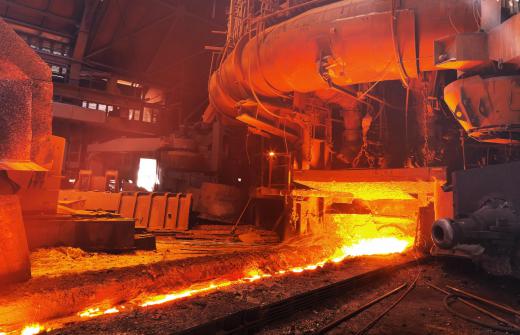What Are the Properties of Metals?
 Jessica Ellis
Jessica Ellis
With more than 70 different types of metals on the planet, some may wonder what defines a substance as a metal. The properties of metals help describe what characteristics a substance typically possesses that makes it a metal, rather than an alloy or non-metal element. They also help distinguish one metal from another, since no two metals will share exactly the same properties. Physical properties, chemical properties, and conductive properties are all areas examined to help define a type of metal.
In terms of the physical properties of metals, they tend to share a few common traits. Most metals are ductile, meaning that they can be pulled and twisted into threads and wires. Metals are also usually very malleable, which means that they can be pounded or pressed into sheets. One other very common physical property is luster, or degree of shininess. Metals tend to be considerably shinier or more lustrous than non-metallic elements.

The chemical properties of metals refer to how the substances react with other elements. Most metals, for instance, react to oxygen over time, in a process known as oxidization. Oxidization is what accounts for the rust on iron or the corrosion of copper. Some metals react with acids, while others, such as sodium, react strongly and violently to water. Not all metals have the same chemical properties; examining these properties is one way to distinguish one type of metal from another.
Many metals have a high level of conductivity, which means that they are good at moving heat or electricity. Not all metals have the same level of conductivity, and the temperature at which a metal is most conductive can vary between substances. Copper and aluminum are highly conductive metals; tungsten and zinc are far less conductive.
Understanding the properties of metals is vitally important for determining the use of substances in nearly any situation. For instance, cast iron may be good for frying pans because it conducts heat well, but is too brittle to work well as a building material. Metal wires are typically made out of substances that are conductive and highly ductile, since they are easier to form into long, twisted strands. Metals that melt and fuse easily are preferred in welding. Without proper understanding of the properties of metals, it is impossible to know whether a beam will hold up a building or a ring will oxidize in a matter of months or over decades.
AS FEATURED ON:
AS FEATURED ON:











Discussion Comments
@croydon - They do vary a lot. Some people like to say that reaction is one of the defining characteristic of metal, like when iron rusts when exposed to oxygen.
But, gold and some other kinds of metals don't react to oxygen at all. That's one of the reasons gold has been used for jewelry, because it won't tarnish like silver or copper.
I think the best 3 properties of metals in a definition are luster, conductivity, and malleability. There are other things you could add on there, like that they conduct warmth, or that they can be drawn out into thin shapes, but I personally think those extras are just subcategories of the first 3 properties.
I'm not an expert though, so take it with a grain of salt.
I remember learning about the properties of metals in high school as part of science. They gave us a bunch of different materials and got us to use a key to classify them, pointing out which ones were considered metals.
It's a funny thing to think about really, since I think most people just intuitively call something a metal, but don't think about why it should be called that.
And the general properties of metals seem to vary so much between them. Even things like malleability changes from metal to metal. I suppose at the same time, even the most brittle metal is still more malleable than some other substance.
Post your comments